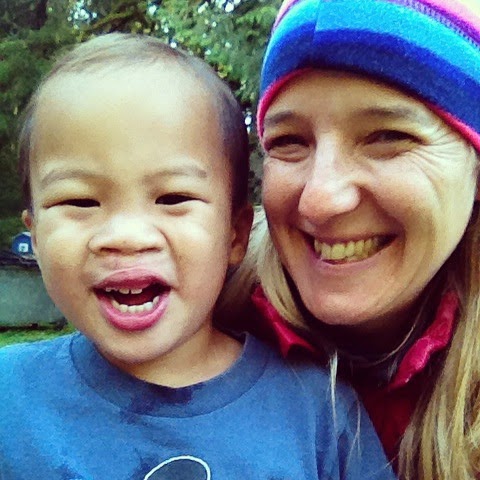I’ve been reading some China forums lately with posts from
families who have kids with developmental delays. It’s been a discouraging week
and a half at our house since we tried a very low dose of Ritalin for Matthew
and had to deal with some very unpleasant side effects. It seems that as it
stimulated Matthew’s brain, it also enhanced some of his neurological
challenges (like head hitting and tics), which were frustrating and hard. And
he was generally fussy and unhappy, even to the point of tantrums, undoing the balance and rhythm at our house
which we work so hard to create.
So it felt like soothing balm to this mama today to read
from some other families who parent kids with special needs. It turns out that
even during the season when parents were bringing home non-special needs kids
from China (mostly 2010 and before), many of the children who came home had
developmental delays because of neglectful orphanage environments.
I don’t know why, but for some reason reading these posts
helped me re-frame our family situation. There are still moments (sometimes
more like hours) when I still carry around a lot of anger and grief about the fact
that Matthew has as many challenges as he does. I’m haunted, a bit, by the
naive expectations I had about bringing home a special needs child from China.
But at the same time, I wasn’t lying to myself with the expectation that our kid would come home and catch up—this is what
so many other families had experienced. I talked with many China adoption
parents before our adoption (in part thanks to our adoption agency who
willingly referred me to other adoptive parents) and the stories I heard,
without fail, were ones of success and a positive transition.
But obviously those aren’t the only stories out there, as
evidenced by the dozens of posts I read today on the China Talk developmental
delay forum. It just wasn’t what we were expecting.
Sometimes I wonder how differently my life would feel now if
Aaron and I had decided with PURPOSE to adopt a child with developmental
delays—if we’d have a different perspective had we chosen the special need we
got. We had done so much reading and
research on cleft lip and palate—and honestly I feel like I have that special
need down pat. It’s traumatic during surgery, and it requires a lot of catching
up with language and feeding, but it feels manageable. This other thing—this
vague developmental delay diagnosis—is not so manageable some days. There’s no
trajectory that’s clearly laid out for getting from one day to the next. It’s
all just trial and error—like our “trial” with Ritalin last week that proved
rather disastrous for us all.
While I was reading the China Talk forum today, however, it
dawned on me that several of the parents who posted were describing their
children who are now 10 or 12 or 15. Our family can’t even begin to imagine or
know where we’ll land because we’re still in the middle of the story. We’re not
even 2 ½ years in, and we’re still unraveling all of Matthew’s threads, trying
to discern what he needs and how to best support him. It’s exhausting some
days—I won’t life—but it’s also really fulfilling and gives our life the kind
of extreme purpose that turns out to be a blessing in the end.
Last night during a walk in the pouring rain, I had a lovely
conversation with one of my favorite fellow adoptive mamas. She’s the one I
call when my heart is so, so discouraged—and she calls me when she’s in that
place too. We’ve vowed to be brutally honest with one another—when it’s good
and when it’s very hard.
After several minutes of me venting into the phone and her
patiently listening, we landed back (together) on the conversation of why
parenting a challenging adoptive child is hard but why it’s also amazing and
good and purposeful. And then she said, “You know, I’m pretty sure when we look
back on our lives, this parenting we’re doing will be one of the most important
things we did. It will be one of the biggest blessings.”
I think she’s right.
Being in the trenches all day with a child who has
developmental delays certainly isn’t easy. Maybe from the outside our lives
look like they are sweet and lovely and put together, and they are some days—but they are also
exhausting, frustrating and discouraging. I won’t lie—it’s a different kind of
life than I expected for myself.
But we’re still in the middle of the story right now.
There’s no telling what the ending will be like—who will be the hero, who will
rise, where this will all end. And in this season, I’m glad that’s the case.
Because just as I do when I read a gripping novel, these days I’m still cheering
for the underdog—in this case, Matthew. I’m still holding out hope that a happy
ending exists—that he’ll win the day—that he’ll stand on his own two feet at
the end of this growing journey and live a life that’s fulfilling to him.
No matter what, I’ll forever be Matthew’s mama, standing proudly by his side, having born witness to each step of the journey, when the ending finally comes.
No matter what, I’ll forever be Matthew’s mama, standing proudly by his side, having born witness to each step of the journey, when the ending finally comes.













